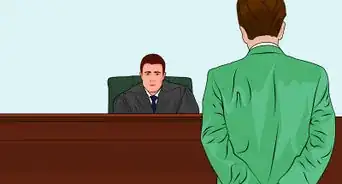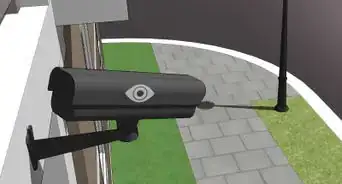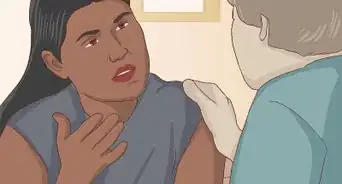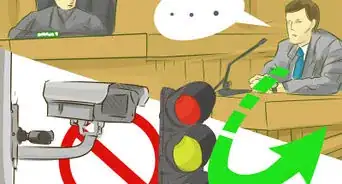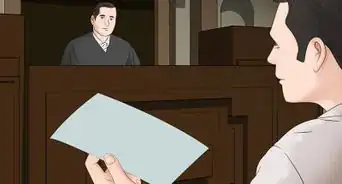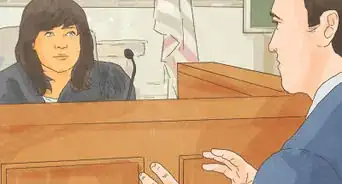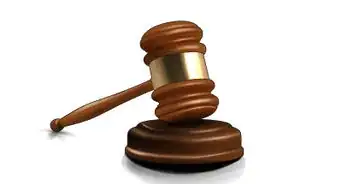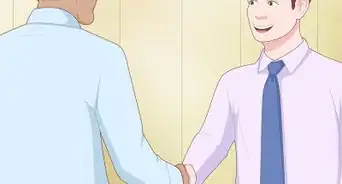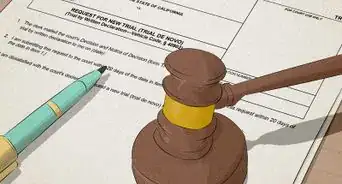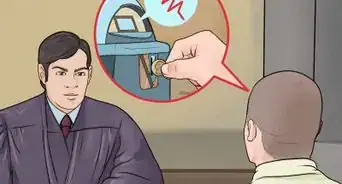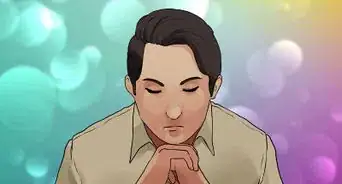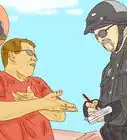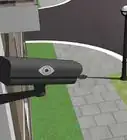This article was co-authored by Clinton M. Sandvick, JD, PhD. Clinton M. Sandvick worked as a civil litigator in California for over 7 years. He received his JD from the University of Wisconsin-Madison in 1998 and his PhD in American History from the University of Oregon in 2013.
wikiHow marks an article as reader-approved once it receives enough positive feedback. In this case, 82% of readers who voted found the article helpful, earning it our reader-approved status.
This article has been viewed 385,276 times.
You might be nervous about what's going to happen when you get pulled over, but remember that officers are the ones who have every right to be nervous. They never know what to expect. Generally, the more you do to help ensure the officer's safety, the more you ensure your own.
Steps
Reacting to Being Pulled Over
-
1Know your rights. A police officer can pull you over for any traffic violation, no matter how minor. They can even follow you and wait for you to commit a traffic violation. Never fight with the police officer or act in a threatening or hostile manner. If you do, the officer could react by arresting you or retaliating in some other way.
- A police officer cannot pull you over without probable cause. Reasons such as your age, race or the type of car you drive are not probable cause for a traffic stop. If you believe that you've been pulled over for an illegal reason, record the interaction between yourself and the police officer, if possible. Simply place your cell phone on your dashboard and hit “record.”
-
2Look for a convenient spot to pull over. Slow down, put your turn signal on, and pull over to the right. This will signal to the officer that you intend to pull over. Try to find a close parking lot or wide shoulder of the road. Many officers will appreciate the consideration. Take the keys out of the ignition and place them on the dash.
- If it's dark and you are alone, you have the right to drive to a well-lit area, such as a gas station, before stopping. If you plan to drive until you find a safe place, dial 911. Let them know that you are being pulled over by a police officer and that you are driving until you find a well-lit safe place to pull over. The 911 operator will communicate this information to the police officer.
Advertisement -
3Relax. Even though getting pulled over by a police officer is scary, you will be okay even if you get a traffic ticket. Take a deep breath and remember that police officers are not evil or scary. They are there to help protect everyone.
-
4Roll down your driver's side window and any tinted windows. If it is dark, turn on interior lights. Make all your movements slowly. The officer is watching you carefully to make sure you're not drawing a weapon or hiding something. Do not reach for anything in the passenger compartment of your vehicle or under your seat. As the officer approaches, put your hands on the steering wheel where the officer can see them.
-
5Don't speak first. When the officer comes over to your car, he will usually ask for your license, registration, and proof of insurance. He is not obliged to tell you why he pulled you over before you comply. When you move your hands, tell the officer that you are getting your license, registration, and proof of insurance. Get them slowly and deliberately. If you're in a dark area, the officer will follow your hands with his flashlight. Finish this process before anything else, then put your hands back on the wheel. While the officer checks your license and vehicle status via radio, keep your hands on the steering wheel.[1]
- Keep your license, registration, and proof of insurance in an envelope (preferably yellow or another bright color), not a pouch. The envelope should be fairly small. You do not want to keep your insurance, registration, and proof of insurance in an envelope that is large enough to hold a gun. If your license, registration, and proof of insurance are in your glove compartment or under your seat (not recommended), ask the officer if you can pull your yellow envelope out of the glove compartment.
- If you fail to provide one of these items, the officer can arrest you for driving without them or can give you a ticket. But, if you have a good excuse for not having these items, the officer may allow you to show another form of picture ID. Then, he'll use it to look you up. This depends on the officer, so try not to drive without your these.
- You have a 5th amendment right to refuse to answer most of the officer's questions (the driver of the vehicle must provide ID, but in most states passengers have no obligation to ID or talk to the police) therefore you should practice your right to remain silent.
-
6Keep your answers brief. Be polite at all times, and refer to the officer as "officer." You may want to ask the officer what his or her name is and their badge number. Many officers wear body cameras so your interactions are being recorded. Many officers love asking: "do you know why I pulled you over?". This is because they're hoping you will admit to something they may not have known of. For example, if the officer stopped you for speeding, but you told them you think they pulled you over because of your brakes, you just gave the officer another reason to give you a ticket and you can expect they will use your own statements against you in court.
- If you are asked, "Do you know why I stopped you?" Always respond with "no."
- If you are asked, "Do you know how fast you were going?" say "Yes." Answering "No" to this question will lead the officer to believe that you are ignorant of the speed limit or how fast you are going. But, if you truly do not know, you can say “I think I was going around X speed.”
- If the officer asks, "Do you have a good reason that would make you need to hurry?" say, "No." If you say "yes," then even if you were not speeding the officer will believe that you were, and you'll probably get a ticket.
- If he asks "Have you been drinking?" and you have not been, say "no" in case you were stopped for driving in an erratic manner. But, tell him if you take medications or have an illness that can cause driving problems.
- If the officer spots or even smells an open container of alcohol, you could be asked to take a breathalyzer and a field sobriety test. A police officer cannot force you to take a breathalyzer test without first obtaining a search warrant. But, because of "implied consent" laws, refusing to take the test is grounds for immediate arrest and license suspension. If this happens, you can be forced to take the breathalyzer in jail if the police officers can get a warrant, which is easily obtainable if you committed a traffic violation.
-
7Follow any orders given by the officer. Refusing to follow an officer's orders will identify you as either resistant or rebellious. This gives the officer the belief that he may have to use force to make you obey their orders. Save yourself the trouble and follow all orders given to you.
- If the officer sees any illegal objects in plain view, he can open the door, reach in, and take them.
- In the USA, moving vehicles are subject by law enforcement to search with probable cause after a traffic stop. Probable cause may include observing occupants in suspicious activities, remarks and things that the officer can smell, see or hear like safety violations, open containers, potential weapons, etc.
- If the officer asks if he can search your car, you can say no. If you refuse to consent to a search, that does not create probable cause. However, courts have a tendency to defer to police on probable cause. Even if the officer's probable cause basis for the search is incorrect, it is often considered a legal search. However, it is also possible that any evidence produced by an illegal search is not permitted as evidence in a trial. It all depends on the exact circumstances.
- Do not engage the officer in any unnecessary conversation. The officer knows why he pulled you over, and anything you say may be used against you. You have the right to remain silent and not incriminate yourself. Don't talk unless responding to a question from the officer. Also do not name drop if you know an officer he works with. Chances are that the officer who stopped you assumes you know the other officer because of a prior violation or arrest.
- Do not exit the vehicle unless ordered to do so. This is almost always perceived as a threat and it is safer for you inside the car than outside, near traffic. If you are asked to exit the car, say, "Officer, are you ordering me to exit the vehicle?" Continue to wear your safety belt. Even though you are stopped, if you are on a busy street or freeway someone can still hit you. Additionally, if you are wearing your seat belt the officer will have no reason to think that you are going to try to run away. If you remove your seat belt before the officer sees that you were wearing it, you might receive a ticket for not wearing it even though you were wearing it, because the officer didn't see you wearing it.
-
8Do not consent to a search. The fourth amendment requires the police have a search warrant or probable cause in order to search a vehicle. Most police officers will not have either. If they ask you for permission to search your vehicle, you should politely tell the officer you do not consent to searches. Be careful, the police can legally lie to you. They may tell you if you don't give them permission to search your vehicle, they will think you have something to hide or will bring a canine dog. To encounter this, ask the officer if you're being detained or if you're free to go.[2]
- Refusing a search does not give the officer probable cause nor could it be used against you in court so you should take advantage of your constitutional right not to be searched for the following reasons:
- If the police accidentally break into your property, they are under no obligation to pay you for the damages because you agreed to a search.
- You don't know if a reckless passenger (such as a friend or family member) accidentally dropped something illegal. If the cops find it, it is fair game and can be used against you.
- Probable cause to search your car may include observing occupants in suspicious activities, remarks and things that the officer can smell, see or hear like safety violations, open containers, and items that could potentially appear to be weapons. Note that refusing to give permission for a car search cannot be considered probable cause. Unless the officer can come up with something else, you will be free to go after the officer writes you a ticket or gives you a warning.
- Be aware that the officer does not have to ask you permission to have a K-9 unit sniff the outside of your car (drugs, people, explosives. etc).
- Refusing a search does not give the officer probable cause nor could it be used against you in court so you should take advantage of your constitutional right not to be searched for the following reasons:
-
9Be polite, and do not argue if you are given a ticket. There's plenty of time later in traffic court if you choose to contest it. Instead, thank the officer and remain in control of your emotions. If you believe that you were pulled over for an illegal reason, or that the police officer did something that was illegal, do not address it with the officer while you are stopped. Instead, try to get or remember the officer’s name for later.
- If the stop is taking a long time, you are free to ask the officer if you are free to leave.
- If you believe that the officer did something illegal, you can contact an attorney. Then, see if you have a case or file a complaint with the county or state where the police officer is based. For example, if you believe the officer profiled you based on your race, consult an attorney and consider filing a complaint.
Reacting if You Are Arrested
-
1Know when you can be arrested. The police can arrest someone during a traffic stop when: the police officer personally saw the person commit a crime or the police officer has probable cause to arrest. When a police officer has a “reasonable belief, based on facts and circumstances, that a person has committed or is about to commit a crime, the officer may arrest that person.”[3]
- For example, if you're driving a car erratically and breaking traffic laws, the police officer may administer a breathalyzer test. If he determines that you have been drinking, the officer may arrest you. Or if the officer sees drugs in your car when he pulls you over, he will have probable cause to arrest you.
- Confirm that you are being arrested. Ask them if you are free to go. If they say no, then ask them what you are being arrested for. After this, stop talking.
- If you are being arrested, let the officer arrest you but do not under any circumstances resist arrest as more charges can be brought against you. Resisting arrest occurs when you try to stop the officer from getting you in handcuffs by fleeing the scene, fighting back, or trying to break free from their apprehensions.
- Remember, you're innocent until proven guilty so attain a lawyer to contest the prosecutor and convince the judge to drop or diminish your charges.
-
2Know what the police are permitted to do during and after an arrest. If you are arrested, the police can do the following things simply because they have arrested you:
- Search your body and clothing.
- Search your belongings.
- Search your vehicle if you were in it at the time they stopped you.
- Ask you to perform a test, such as a field sobriety test.
- Ask you questions. Note that you do not have to answer and you have the right to remain silent.
- If this happens to you, stay calm and cooperate with the police officer the best you can.
-
3Understand your rights. Police are required to read you what are known as your “Miranda rights” before they question you after an arrest. This informs you of your right to remain silent when you are being questioned, if not anything you say “can and will be used against you.” The police cannot threaten you or force you in any other way to talk to them or give them any sort of statement. If this happens to you, tell your attorney immediately.
- If the police start to ask you a lot of questions and you believe that you will be arrested (you will probably have a pretty good idea), it is best to stop talking. If you are going to be arrested - zip it. Anything you say before you have been arrested can be used against you.
- If police interrogate you without giving you the Miranda warning, the statements you make cannot be used as evidence against you at trial. Be aware that the police will ask you over and over again if you would like to talk to them even after you have been Mirandized. The police are allowed to trick you into talking. They are not required to be honest with you even after you have been Mirandized.
Warnings
- Don't use profanity or obscene language. Also, never say to the officer that you know your rights. Instead, show to him that you know your rights by calmly asserting them under pressure.⧼thumbs_response⧽
- Don't try to lose the cop. Sure, it may seem like a fun idea to get on TV for a few hours while news and police helicopters chase you, but be assured that there is nothing worse in this situation. They will catch you and have very little sympathy for you after you endanger them and the public.⧼thumbs_response⧽
- Do not carry open alcohol containers while in a vehicle, as you may be cited for that in addition to being charged with DWI/DUI. If you are a passenger, you may be cited for the open container. If you have just been to the liquor store, place your purchases in the trunk in case you are in an accident. If the bottles break inside the car, the officer may suspect you were drinking.⧼thumbs_response⧽
- Do not carry illegal or dangerous items in your vehicle, or on your person. Doing so may result in the officer seizing your vehicle and placing you under arrest.⧼thumbs_response⧽
References
- ↑ http://www.businessinsider.com/rights-when-the-cops-pull-you-over-2014-1
- ↑ http://www.businessinsider.com/rights-when-the-cops-pull-you-over-2014-1
- ↑ Spinelli v. United States
- ↑ http://www.businessinsider.com/rights-when-the-cops-pull-you-over-2014-1
- Criminal Procedure, Joel Samaha, 2011 Edition.
About This Article
It’s natural to be nervous when the police pull you over, but if you stay calm and comply with the officer’s requests, it should go smoothly. When the police flash the car’s lights or blip the siren, pull over as soon as it’s safe to do so. Roll down your driver’s side window and wait for the officer to approach you and speak. Hand them your license and registration if they ask for it and comply with any of their demands. Make any movements slowly and keep your hands visible as much as possible so the officer knows you're not hiding anything. Remember that you have the right to record the interaction on your phone for evidence if you want to. To learn your rights if an officer asks to search your car, and more advice from our Legal co-author, read on!
-Step-1-Version-2.webp)
-Step-2-Version-2.webp)
-Step-3-Version-2.webp)
-Step-4-Version-2.webp)
-Step-5-Version-2.webp)
-Step-6-Version-2.webp)
-Step-7-Version-2.webp)
-Step-8-Version-2.webp)
-Step-9-Version-2.webp)
-Step-10.webp)
-Step-11.webp)
-Step-12.webp)


